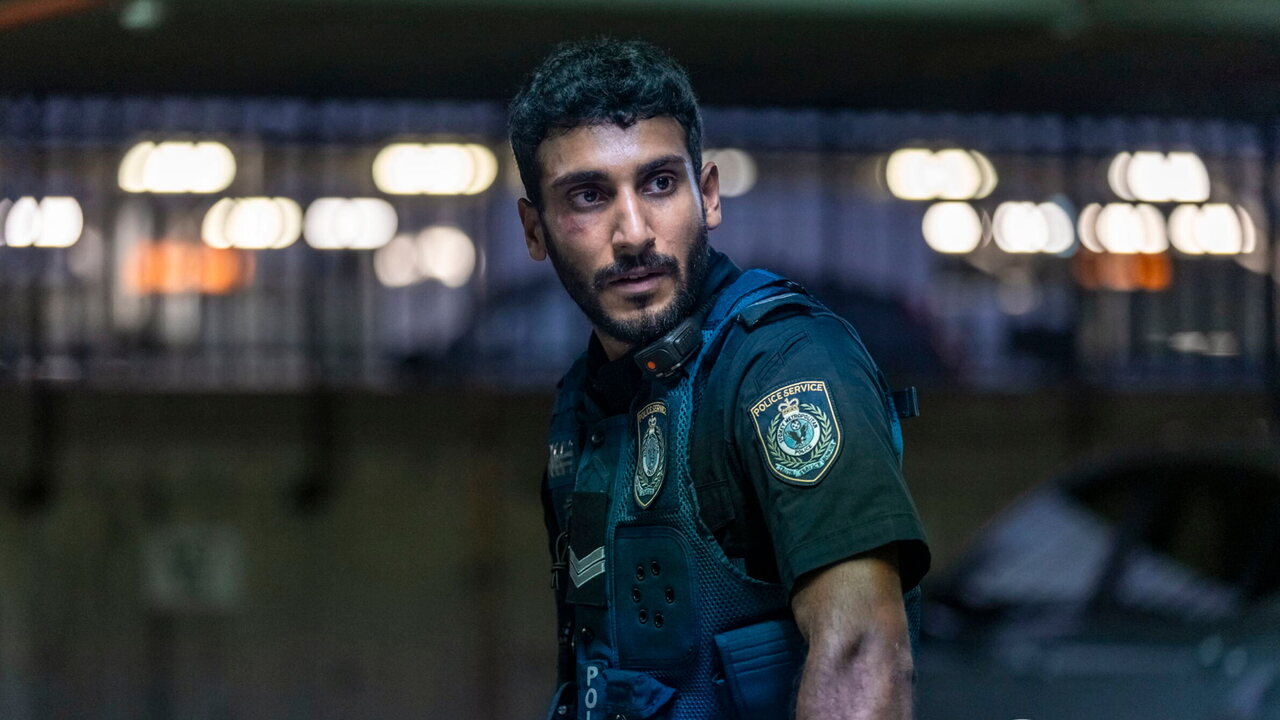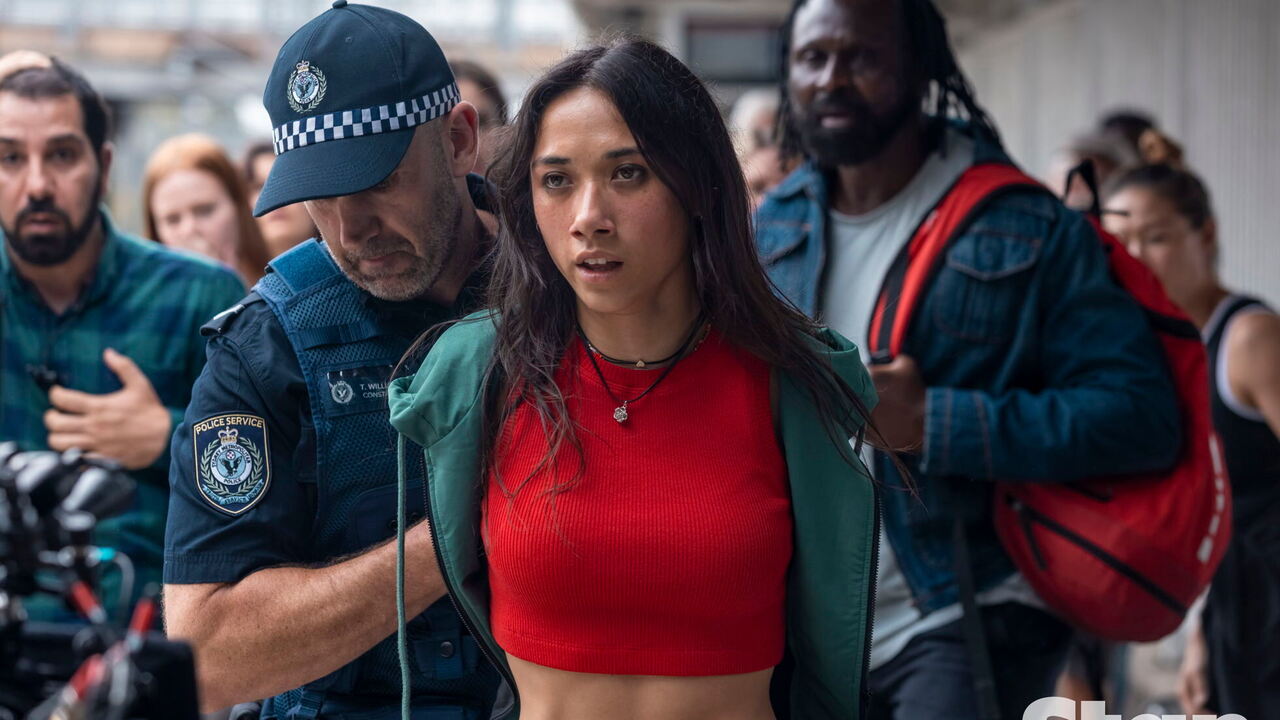
With some shows, you almost immediately realize whether you will spend the next few hours in joy or tedium. Critical Incident, thankfully, gives you the former impression. Created by Sarah Bassiuoni, this six-episode crime drama assures you it's going to be one hell of a ride during an intense scene in the first episode that unfolds at a house party packed with teenagers. While the police officers try to break up this drunk gathering, the young attendees rebel against the authorities by either provoking them or showing reluctance to leave the party. They all hang around the premises and tease the police. Slowly, this teasing shifts from being verbal to being physical, and you feel it in your guts that something horrible is going to be unleashed in the open. Director Neil Sharma allows the suspense to build. He releases chaos in small doses steadily and then detonates the bomb with such force that you find yourself stunned. Critical Incident contains more masterful scenes that keep the viewer on edge and end in an unexpected manner. Consider what happens when Senior Constable Zilficar 'Zil' Ahmed (Akshay Khanna) chases Dalia Tun (Zoë Boe). The two characters end up running on a railway platform, leading to an accident that sends everybody and everything into a wild turmoil. This accident is the titular "critical incident."
While watching a show or a film, we expect characters to behave in a certain way. So many movies generally tread on clichés, and since they are more ubiquitous than something with an original vision, we get cinematically conditioned by them. We make predictions based on the characters' initial behavior and expect them to walk on the path we mentally make for them. Well, they usually do what we expect them to do, which I am happy to report doesn't prove to be true for Critical Incident. Some threads here lead you to come up with a handful of predictable outcomes, but the show happily subverts your notions. Ty Egan (Hunter Page-Lochard) acts like an alpha male. He undermines Hayden (Jai Waetford) in every way possible by being a bully in front of Dalia, Hayden's girlfriend. When a man becomes all macho in front of a girl, one concludes that he is simply trying to impress her with his muscular strength. Ty might as well be saying to Dalia, "Leave Hayden. He is weak. You should be with someone strong and fierce." Ty, however, doesn't make any romantic or sexual advances towards her. He simply likes asserting his influence and likes people who can benefit his drug business. Kasim (Akkshey Caplash), Zil's brother, has a wife named Zahra (Rina Mousavi). She acts in a way that leads us to believe she has a crush on Zil. Notice how she moves up to walk alongside Zil in front of Sandra (Roxie Mohebbi), his girlfriend. At one point, Zil and Zahra kiss - an incident that any other show would have taken as a cue to enter the realm of infidelity and sex. Critical Incident, though, shocks us by hitting us with Zahra's guilt. Later, when a highly defeated and guilt-ridden Zil goes to the railway station, you are almost convinced that he will commit suicide by throwing himself in front of a moving train. But...
In Critical Incident, the characters don't carry themselves as per your expectations (Hayden looks as cute as a teddy bear but says, "ew" when Dalia tells him she is on her period). Even the events don't always unfold in a formulaic way. Many stories like to paint everything with broad strokes, giving us black-and-white worlds where we can easily identify who is good, who is bad, and who should be blamed for all the mishaps. It's hard to blame anyone in Critical Incident entirely. The characters appear as victims of society as well as their own actions that are taken under great psychological distress. Zil is sad, angry, confused, and irritated when he receives information about a suspect who had hit his girlfriend on her head. At the same moment, Dalia runs towards the bus stop to catch her bus. These two characters are unaware of each other's situation. So when they collide, they misinterpret things about one another, which leads to a fatal accident. Zil acts on the notion that the suspect is a young Asian girl wearing a red-colored top, while Dalia's impulses are guided by a past incident that has made her lose trust in the police officers. Any action taken with just knowing half of the information can be unpleasant. Half knowledge can be more dangerous than no knowledge. A girl attacks Dalia because she thinks she is responsible for putting her brother in the hospital. The truth is that it's Zil who actually pushed her brother at the railway station.

Critical Incident sees police brutality originating from the brotherhood displayed by the officers. The men in uniform blame Dalia for spoiling their image, so they harass her by doing drug checks. Zil pushes it all to the breaking point by increasing the frequency of the checks. He attacks because he is pissed at Dalia for purposefully hiding the fact that he informed her about his professional identity before running after her like a madman. Dalia retaliates by detaching herself from good values and embracing criminal methods. Her decision robs her of a happily-ever-after with Hayden. He wants to quit the illegal business. Dalia, though, uses this profession as an outlet to strike back at the cops for failing to offer people like her justice. Zoë Boe effectively brings Dalia's bitterness to the surface. I almost wanted to look away from the screen when she was strip-searched by Sandra during her periods. The cops search Dalia when she doesn't carry drugs in her bag. So she decides to take them in little plastic bags out of aggravation. You can hear her screaming, "You guys think I am a drug dealer? Fine, I will become one!"
The real culprit here is the system that makes villains out of good people. Two cops become rivals over a promotion. Zil is one of the few officers who follows all the rules and does things according to the books, but he misuses his power to take revenge on Dalia, and he is even encouraged to do so by his fellow officers. The system, Critical Incident suggests, is broken. The minority community doesn't trust the police because of their racism (by making Zil a poster boy for excellence, the department throws a cover on this problem). Sandra is constantly put on hold when she asks for details regarding phone records. Zil, too, is told to book an appointment when he calls a mental health line. Everybody is busy dealing with their own rules, and their own situation, often disregarding empathy and understanding for others' experiences (the one character who tries to fix this mistake meets a grim conclusion). This is why the show doesn't end on a happy note. The police call a confession "bullshit," the bad guy probably lurks in the shadows to take his revenge, and the character who has already suffered so much will only suffer more. The cycle of destruction continues to roll.
Final Score- [9.5/10]
Reviewed by - Vikas Yadav
Follow @vikasonorous on Twitter
Publisher at Midgard Times
Hi Everyone, after a due consideration, we have decided that we will be open for donations to help us in managing our website. We will be greatful for any kind of amount we receive. Thanks!
— Midgard Times 🎬 (@Moviesr_net) January 4, 2026
PayPal- [email protected] pic.twitter.com/DlNNz5Npm5
Get all latest content delivered to your email a few times a month.
Bringing Pop Culture News from Every Realm, Get All the Latest Movie, TV News, Reviews & Trailers
Got Any questions? Drop an email to [email protected]